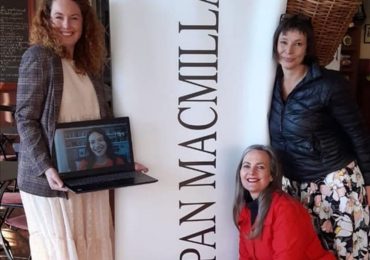Rebecca Davis chatted to The Reading List about her new book Self-Helpless: A Cynic’s Search for Sanity, a humorous take on the self-improvement industry, out now from Pan Macmillan!
In Self-Helpless, Davis’s razor-sharp wit combines with her acute powers of observation to produce social and political commentary that will have you in stitches even as it informs and provokes you to think seriously about the topics she discusses.
The Reading List: You’ve spoken about how the self-help industry is not a new thing – and how anxiety pills, for example, began being prescribed in America in the 1950s – but do you think we’re reaching a new level of mental fragility?
Rebecca Davis: This is a very difficult question, and I’m totally unqualified to answer it, but that’s never stopped me before! I think there is definitely evidence that we are paying more attention to mental fragility than ever before: in terms of both the numbers of prescriptions written for anti-anxiety drugs and anti-depressants, and the explosion of the self-help industry.
But this alone doesn’t suggest that we are, as humanity, less resilient than ever before. I just think that in the last 20 years in particular, the idea of seeking help for emotional and mental health as well as physical wellbeing has become more acceptable in the mainstream.
The obvious caveat is that this is certainly both age-specific and culturally-specific up to a point. In terms of age, the fact that we’ve seen younger members of the British Royal family talking openly about struggling with depression – to give one example – suggests that there’s less of a stigma attached to that discussion for younger people. One can hardly imagine the Queen or Prince Philip initiating that conversation in public.
And for evidence that this is culturally specific too, we know that in very religious or traditional or conservative environments people are less likely to seek help for mental health issues. South Africa in general, I would say, has something approaching a crisis of undiagnosed mental health issues resulting from both the experienced and inherited trauma and guilt of apartheid.
There’s a lot of carping these days about snowflakes and so on – but in general, I think it’s a good thing that people have found a language in which to discuss vulnerability and anxiety more openly.
The Reading List: This book was sparked by you giving up alcohol – before this, did you ever write and drink? If so, did you find you faced any writer’s block after giving up drinking, or did your writing process change?
Rebecca Davis: When I drank heavily I could barely walk, let alone write. And writing was the last thing I wanted to do when I was drinking: I was drinking to get out of my head, not further into it. Now I’m very grateful for that, because I don’t have any emotional association between drinking and writing at all. Maybe it would be different if I were a novelist – but I write journalism and non-fiction, and I don’t find that booze and facts mix well at all.
The Reading List: You mention a recent trend of soothing self-help books that allow ‘adults to regress to an infantile state of safety and comfort’, and how this trend is not confined to the self-help industry. What do you make of the rise of ‘kidult’ culture? Why do you think it’s so appealing?
Rebecca Davis: Kidult! That’s great. I mean, I think this links to my first answer – I don’t think necessarily that a desire to regress to childhood is a new thing, just that it’s more acceptable to explore. Although I must note that adult colouring-in books, for instance, never explicitly market themselves as enabling you to retreat to childhood. These tactics still get packaged as very adult-appropriate stress-relief methods – so I think we’re still a little way off being able to openly admit that sometimes all we want is for someone to tuck us in and tell us it’s okay to suck our thumbs.





